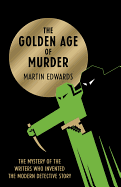
Readers who are only vaguely familiar with Golden Age detective fiction, written mostly during the 1920s and 1930s in Britain, often fall prey to a set of false assumptions. These novels are often stereotyped as "cozy," dismissed as lacking in psychological depth or shocking twists. In The Golden Age of Murder, his fascinating study of London's Detection Club of mystery novelists (founded in 1930), Martin Edwards dismantles these theories in a manner worthy of the finest fictional detective.
Edwards, himself a mystery novelist and the Club's current archivist, opens with an account of the Club's initiation ritual, which includes ceremonial robes, lethal weapons carried as accessories and a human skull known as Eric. Focusing on the Club's three prime movers--Anthony Berkeley, Agatha Christie and Dorothy L. Sayers--Edwards chronicles its history and showcases the many ways in which its members past and present have pushed the boundaries of detective fiction. True crime, forensics, political passions and complex personal entanglements all had a shaping influence on members' lives and their books. Edwards addresses all these and more, setting his brief biographies within the context of the turbulent times in which these writers lived.
The large cast of characters, both real and fictional, grows unwieldy at times, but Edwards's eye for detail and his passion for his subject make the book a pleasure to read. Mystery lovers will find their to-read lists growing with every chapter. --Katie Noah Gibson, blogger at Cakes, Tea and Dreams

